Classic interview: John Mayer – "It has never changed that joy and passion and chemistry of just picking up the guitar and playing. In fact it's made it more important."
Mayer on keeping the music sacred from celebrity, what makes a dream guitar and Battle Studies from 2010

Back in 2010, Guitarist magazine's Mick Taylor sat down with John Mayer and talked about his life, gear and how it all adds up on his latest studio album Battle Studies – this is the full interview.
Congratulations on the new record - it must have been a tough call to follow Continuum, with the amount of success that record achieved?
John Mayer: "Well, it's a tough thing in that you have to do something and I'd gotten to a very safe place with Continuum where it was very well liked after a certain point.
"People understood it and it was a big part of the success of my career and I remember thinking, God, I wish I didn't have to update this because you then take that off the perch of the last thing you've done.
"There's a bit of safety in saying, Yeah wow, the last thing I've done is Continuum, except that, too much time was passing before another record had come out.
"And so there's just a little bit of facing the music - no pun intended - of like, You've gotta try something else - Continuum will not be the latest record; you need to take it off the perch and put something new in place of it.
"So I think that was the success in it's own right, of learning how to say, Look, there'll be plenty more of these things, we've got to put Continuum into the, er, sleeping chamber and do something else. Y'know, I don't make Continuum for a living.
Want all the hottest music and gear news, reviews, deals, features and more, direct to your inbox? Sign up here.
"From there I think it got a lot easier when I realised that no matter what I do, it's not going to be Continuum, good or bad. And then that became really liberating…"
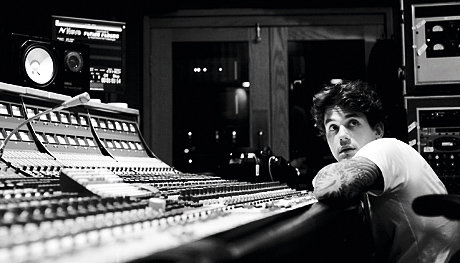
When you started Battle Studies, how were you feeling about John Mayer, solo artist, as opposed to the John Mayer Trio, and also the Live In Los Angeles release - a different perspective, perhaps?
"The Trio stuff has always been a blip in time because we don't get much time to play together, but I just had this feeling and I still defend it. I wasn't feeling like a grizzly bear guitar player; I wanted to take a break from muscle man guitar playing and just strum and enjoy my life and write these songs that were sort of strummy.
"There's something that happens when you put a record together that you can't foresee and that you have no control over and it's just the way those songs congeal.
"And so Battle Studies is just a different album - the attempt is the same whether it's trying to do blues, R&B, a soul thing like Continuum, or a seventies rock thing, the attempt is the same to put the best group of songs together, and the hope is that when you put them together it sort of takes on its own life.
"And this is actually starting to in a cool way; it's really starting to make sense to me now as time goes on. We're done with looking at how's it doing in week one and week two; people are getting a real chance to sit with it and live their life with it.
"So now we're launching into tunes and it's exciting and the band's learning how - I'm learning how - to play them. Because as a guitarist, also as a singer, just because you composed it, doesn't mean you can play it really well. And even just because you recorded it, doesn't mean you can play it really well.
"So for the first three/four months, it's really like getting under your fingers."

Presumably you were exploring a lot in the studio; writing in the studio, rather than beforehand?
"Yep. It's a tricky proposition; it's sort of a gamble. If you go into the studio - I mean studio time is very expensive - and if you go into the studio and explore and don't find what you're looking for, then you get - or at least I get - disheartened very fast and it can send me into a flat spin , creatively.
"I have to really be sure that if I'm going in to sort of pull stuff out of the sky, then something's gotta be there. Cos if it's not, I don't want to take that phone call that says, You might want to go and get a house somewhere and write some songs…
"I take it very seriously when I walk into the studio and I say, I don't have anything yet, but follow me here. It makes me want to produce something great, because the alternative to that is admitting that you got everyone together and nothing came of it."
The last time we spoke, you'd just got a '52 Blackguard Telecaster, and that was in some way inspiring you in a different direction…
"Oh, yeah, I just played it the other night…"
So do different guitars take you in a different direction writing wise?
"Absolutely. In fact I have a whole rig designed just for that guitar. A little Deluxe - an old 'Blackface' [Fender] Deluxe, some really cool delays, a little bit of distortion… There's a beautiful chimey, country-ish eerie record that's in there."
You can hear more Tele-type sounds throughout the whole of the new record - the Rick Turner guitar on Half Of My Heart, for example…
"Yeah there's something really fun this time out about playing the guitars on the stage that we played on the record; the same guitar with the same pedal that was on the record.
"They just contribute to this overall harmonic fingerprint that you know is the same as on the record, so there are times when we're playing them when we're, like, Man this is just the record!
"Plus there's a strange company that's kept when you are playing the guitar from the album. Y'know, I'm not that far from home right now, 'cos this is the stuff that was with me in LA."
We were talking with Mike Eldred from the Fender Custom Shop recently, and he was telling me you really like the Cabronita Especial…
"The Cabronita! Yeah I love that guitar. It took me 10 years to… no, more than 10 years, 15 years, to really be able to put a Strat down and play something else. My favourite guitar right now is this Les Paul SG - you know what I'm talking about?"
The '61?
"Yeah, '61 something like that, such a cool guitar."
That's a very different vibe for you, compared with the usual Strats?
"Yeah, like I said, I've sort of pulled out of the muscular, kinda' atom bomb guitar playing. It's more fun for me now to… like the lead line in Friends Lovers Or Nothing - I take more pride in having composed that than in having recited an Albert King thing on top of another composition.
"[Sings the melody]. It's really a sweet, sweet melody, it's almost kinda corny, and I really enjoyed double-tracking it for that sort of Harrison-esque tone."
Would you say that's what you're best known for - the melodic riffs and hooks?
"I'd like it to be!"

So then, as someone who clearly continues to aspire to be a great guitar player, do you still feel that pressure to do the guitar hero thing?
"Well no, and that's why I got out in front of it and said I want to make a pop record. So the next one couldn't be a pop record. I work in polar opposites.
"Like we all do - half your readers are all the way on this end of loving the guitar again, half your readers are nearing the other end where they just want to put it down. We all work in opposites: it's all this until it's all that.
"You go through phases like, Oh man, I'm having this total Charlie Christian phase. Then it's, Oh, I'm having a Pearl Jam phase… Or Bill Frisell, or that Hendrix bootleg… That's how it happens - you make these giant strides from both ends of the spectrum and back and forth and back and forth.
"I think it's more important to continue to tell your story than to obsess about what kind of record you're going to make"
"So when I'd played this muscular guitar thing, I was like, I just really wanna take a break from it. And all that really does - as any guitar player knows - it just serves to set up the next time you get into it you're gonna be that much more excited, because you cleansed for a minute.
"And I think that all has to do with how important you records as. I see them as moderately important."
Records are moderately important?!
"I think it's more important to continue to tell your story than to obsess about what kind of record you're going to make: they're not that valuable. Especially when you look at what goes into making them.
"I mean it's a lot of work, but what do I know? I'm just writing one song at a time and putting them together. And if that doesn't work, I'll do it again and put them on the next record.
"I'm learning how to not take records so seriously, or be less precious about them. Like right now, I wanna do this kind of record. And the next time out, I'm starting to get a sense of what that might be; really raw, really in your face…
"The one thing I've never really learned how to do very well is how to make something sound loud on an album - how to make an album sound loud and in your face."

And presumably we're not talking about compression and mastering here?
"Right. I just want to mic it right, and get the right noise and be really raw, have it sound like four or five people playing in a room together - like a Pearl Jam album."
Can you tell us the story of The Black One? [Mayer's main Relic Strat as featured on issue 327's cover.] I saw a prototype at the NAMM show in January that looked suspiciously like your guitar…
"That's a really interesting guitar. It was October of 2004 and I'd come off the road after a really long tour on Heavier Things. And I thought I wanna have a little bit of like, a field trip… Y'know.
"We used to have this show in the US called Mister Rogers' Neighborhood. You ever heard of Mister Rogers?"
"I sort of saw of it as like, I wanna to visit where guitars are made. I want to spend a couple days and I want to watch how these guys do it, and I want to build a guitar"
We haven't…
"Well Mister Rogers would, every show, go to maybe like a factory where cheese was made, or to the set of a movie, or where they make crayons, or a fisher boat… he would just go on these adventures.
"And I sort of saw of it as like, I wanna to visit where guitars are made. I want to spend a couple days and I want to watch how these guys do it, and I want to build a guitar - I want to put my own hands on a guitar and I wanna build it.
"So I went down to Corona, California to the [Fender] Custom Shop for two days. Started from scratch, picked a block of wood, y'know, knocked on it - which did nothing but it made me feel like I was looking for tone! Put it on the CNC machine… I mean people were doing it for me, but they'd at least let me do one side of the guitar or something.
And put it together, then sprayed it, painted the thing, then left it there and John Cruz distressed it and sent it to me… sounded like shit! Which just broke my heart. Turned out there was a problem with the grounding, the shielding inside the guitar. As soon as it got fixed it was like, waaaaaaa! It was dream-come-true."
"As soon as you start getting greedy and you call Fender and you go, I want one like this sunburst, but can you make it blue? The blue one is going to sound and feel terrible"
What makes the dream guitar, then?
"I'll tell ya' the number one rule about guitars for me is that, I'm so sorry you couldn't get the colour that you wanted, but if you pick up a guitar at a store and it's sunburst, and you hate sunburst, but it feels and plays great for you - lightning strikes - then that's your guitar!
"As soon as you start getting greedy and you call Fender and you go, I want one like this sunburst, but can you make it blue? The blue one is going to sound and feel terrible. Never in my life has that ever succeeded.
"Sterling Ball made me - have you seen the Ernie Ball 25th Anniversary guitar?"
Yep, we reviewed it…
"I love that guitar! Do you like it?"
Yeah, very much so…
"I really love that guitar. It's… why do those types of guitars… sometimes they don't commit to any one sound, but this one has some pretty cool sounds on it. He sent me one and it was the cherry red one. And I had a hard time with that colour and that quilted sort of, super-sleek sporty guitar colour.
"So I said, Can you make me a black one? And they made me a black one and it wasn't happenin'. It was happenin', but it wasn't doing what this thing was doing. So they ended up taking the red one, sanding the finish off and repainting it black…
"So to get into that stuff where you want the colour you want, and you want to be lucky enough to have lightning strike twice - it doesn't happen.
"But [The Black One] just struck. All of a sudden this guitar started doin' it. And as the guitar started to age it got different; within months it started to sound different. So it was a labour of love and it's all of the Continuum record.
It's in a couple places on Battle Studies, but it really is the Continuum guitar - you know, it's just fucking great every time; it's the best feeling guitar I've ever played."
Could you say why?
"Y'know, I still can't get a guitar manufacturer to explain to me why two guitars that are made in exactly the same way, why one of the guitars has more [string tension] slack than the other.
"They will tell you like, No, the scale length is exactly the same. So why are these strings tighter? You know what I mean? And why do these ones go loosey goosey and all buttery?
"I still can't get a guitar manufacturer to explain to me why two guitars that are made in exactly the same way, why one of the guitars has more [string tension] slack than the other."
"But this one is the same guitar, and you're telling me it's the same specs, and I can't get the strings to have a swish to 'em, y'know? Who knows what it is? The infinitesimally small differences in tolerances of measurement between one guitar and the other?
"But that one [The Black One] just has a little extra slack; like a little leeway. Some guitars you'll put 0.011s on, and it's like [makes abrupt noise] and you just can't move around."

And the Custom Shop is making some replicas for sale?
"Yep. We'll be offering that to the American people… And the English people of course!
"They're building 83 of the Custom Shop version, and an unlimited run of the production model; the same sort of specs on the guitar, not distressed. It'll be great; piano black, gold hardware - beautiful."
Did the idea for the gold hardware come from your Stevie Ray Strat?
"The gold hardware came from the SRV Tribute Strat - the neck is actually from the SRV Tribute Strat, so that's why it's got those mid-eighties Fender replacement knobs.
"Uh, I'm trying to remember now… Is the tremolo gold? You think I'd know… I've played it so much now that it has that extension of the body thing…"
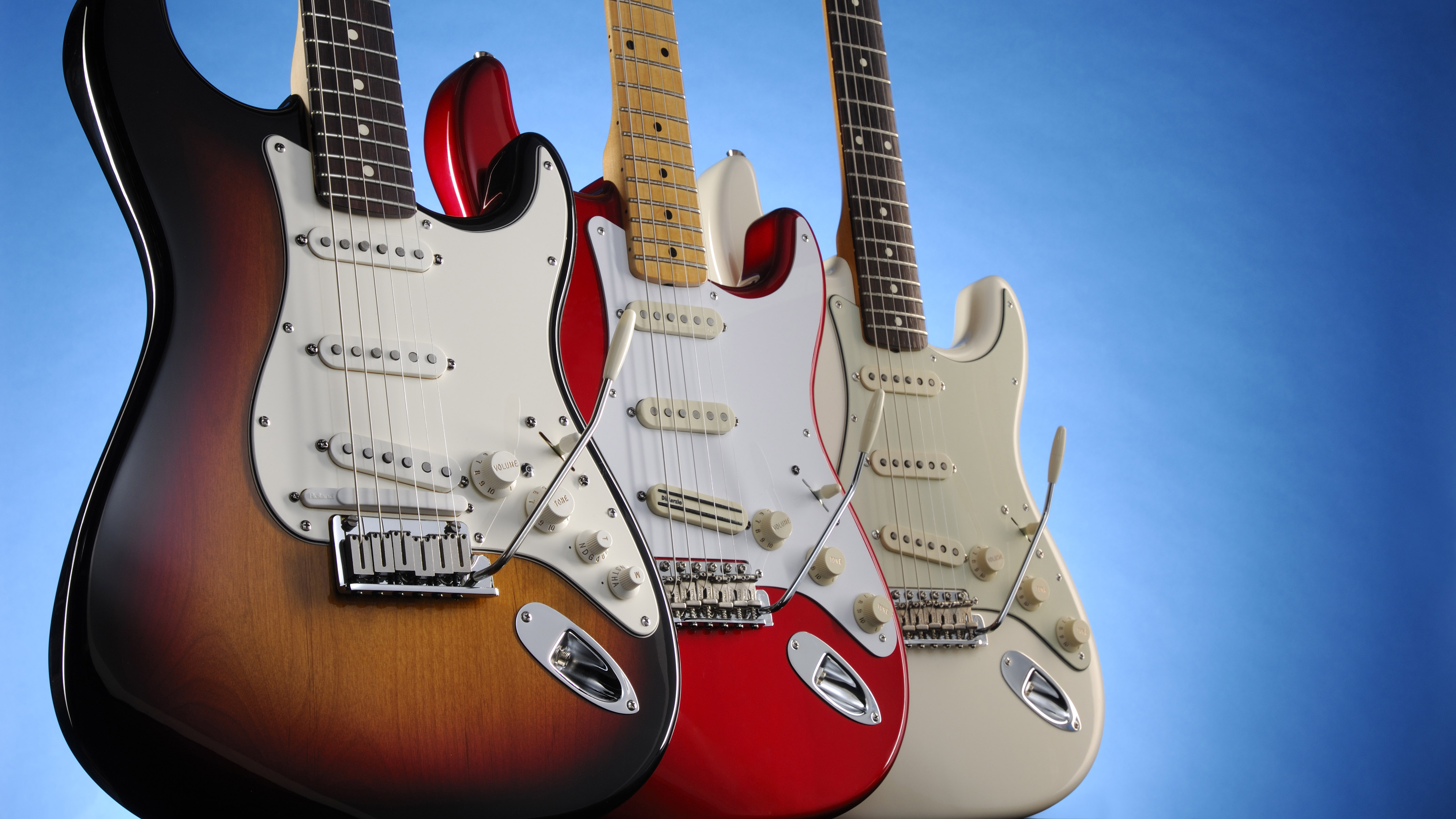
Seeing as you mentioned string tension then… Sometimes you play a reverse-peghead Stratocaster. Do you find that makes a difference to how the strings feel under your fingers?
"Well theoretically, the nut is there to make everything even after the nut. I've never really noticed a difference. Did I answer correctly?"
I'm not sure there is a correct answer…
"Nah, I'm wondering if you agree with me? Although, I do have one reverse-headstock guitar that's not the easiest to play…"
Is that because of the maple 'board - the Hendrix prototype guitar, presumably?
"It's a weird radius, it's very sticky… More important than that is that if you're playing a righty-strung-lefty, then the polepieces on the pickups are reversed and that makes a difference. I think that's what made Hendrix sound a lot like Hendrix."
What are your other main, favourite Strats?
"I have the painted Hendrix Strat; the Monterrey Strat. I have my signature mode, the green one, the cypress mica one. I have the signature model with the stripe on it…
"Any one of those guitars could last the whole show. But I've just got very specific for one reason or another about playing certain guitars for certain songs.
"So for Vultures [from Continuum, 2006], I have to play the gold-leaf Strat. That's what I wrote the song on, and that's got that incredible second position - what do they call it, the quack? That's the quackiest Strat of all time! Vultures does not work on another guitar. That weird, hollowed-out, out-of-phasey-type sound.
"But there are some guitars that I have literally never played more than one song on. Like I've never taken that gold Strat and played any other tune on it than Vultures. Although I could - when I used to play Something's Missing [from Heavier Things, 2004], I had this Strat-Tele that [Fender Custom Shop master builder] Chris Fleming built.
"It became the allocated guitar, with the tuning for that song [E B E F# B E]; it comes out of the coffin and I'd play it for Something's Missing, then it went back in and stayed in that tuning.
"Then when I stopped playing Something's Missing, it was like, This is a great guitar for other things; tune it back into standard…"

Guitars really do put you in a headspace don't they?
"Uh-huh. Once I write that song on a guitar, it's very difficult to play that song on any other guitar."
You've done good things for positions two and four on the Strat selector switch - for a time it was THE thing, but it fell out of favour. You've given it some new life…
"Well thank you. I've always like that sound, especially the fourth. When I was a kid, that was my favourite sound on the guitar; it's even, it's smooth, it has chimeyness but it still has bass. It's the most colourful selection on the Strat."
It suits those three-note inversions that you often play…
"Yeah, exactly. Sort of in the centre of the fretboard; that sort of [sings three notes], the one, the two and the five. I think that's sort of my signature. [sings again, cycles around].
"Everyone has those favourite things. The other thing I've heard people do and I think, Oh, that's maybe 'cos of me, is that close minor 9, like a major 7 thing [sings again], then if you smack it on the guitar, the percussive thing - that might be my doing."
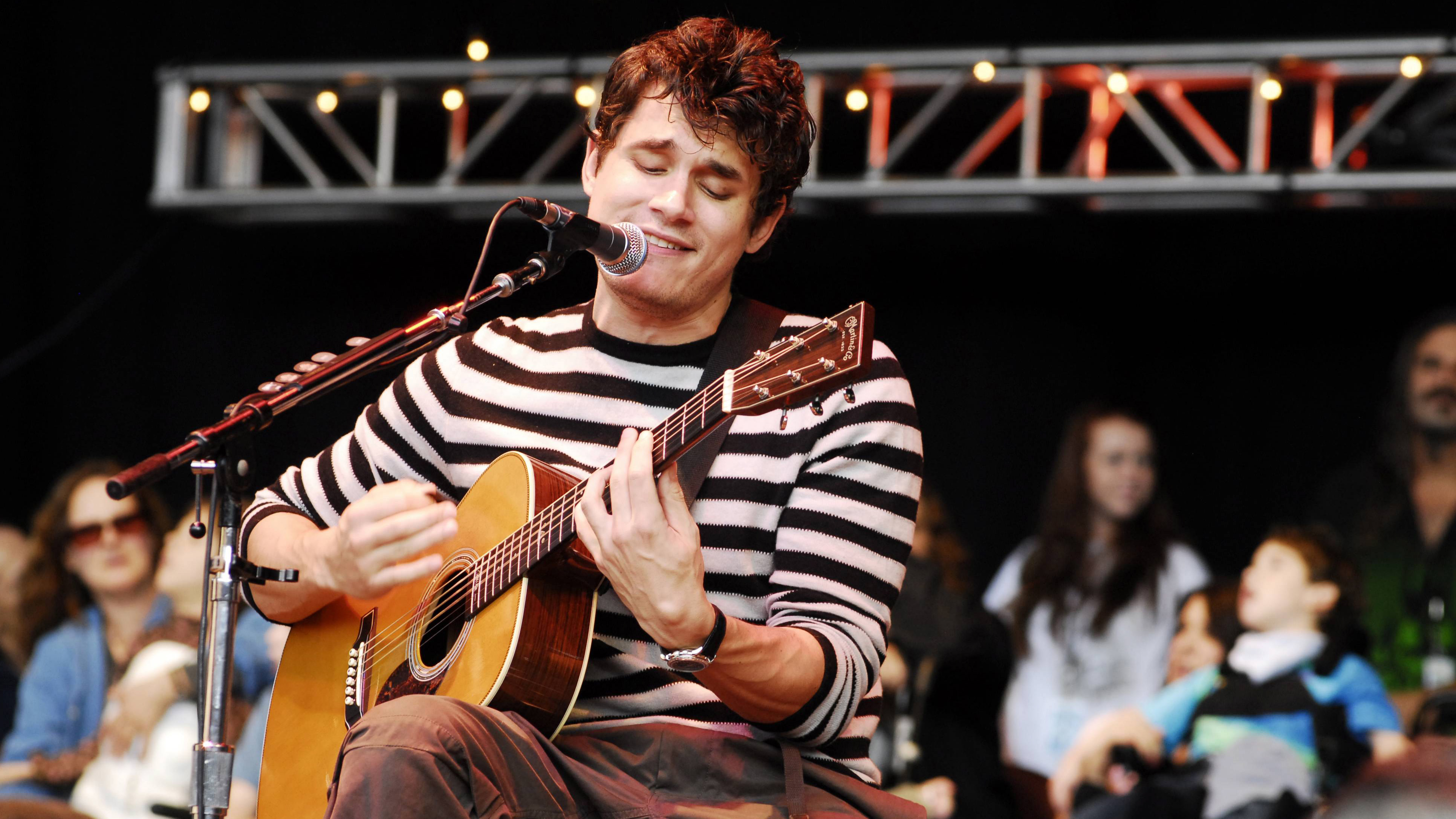
Does that come out of your acoustic playing?
"Exactly. Trying to keep rhythm, then moving the thumb around was basically trying to simulate being in a band when I wasn't there."
Thinking about acoustics, in the early days, you started off with alternative tunings, complicated parts with bass and melody, but on the new record it feels like you're more relaxed, playing less… Is that confidence - less to prove, perhaps?
"Y'know, the more you write for yourself as a guitar player, the less you can walk around and take in the evening"
"It's confidence, and it's wanting to have a little bit more fun on stage. Y'know, the more you write for yourself as a guitar player, the less you can walk around and take in the evening. And a lot of those songs are so involved.
"But it's nice to have the band have something to do with the music! When I was making Room For Squares [2001], it's very difficult to accompany that music with a band because so much of the band is being taken care of by the guitar playing; the percussion, this and that…
"So recording [Battle Studies] was a joy because it wasn't all taken care of in the guitar. It wasn't like, once my guitar part went down the song was full, because a lot of times you're asking the drummer to play the same pattern as you're playing on the guitar.
"So you're already playing twos and fours [sings an example], so you don't leave room. But this record was much more about being a band."
Do you think the acoustic might be an area that you'd revisit for an album at some point down the line?
"Of course. I'd like to make my folk record. Absolutely - it'll all get used!"
"The Two-Rock puts into the Dumble what the Dumble doesn't have, but man, the Dumble will SCREAM at you"
Back to electrics, you have your Two-Rock and your Dumble amps on stage - how do you use them?
"I use the same amps in the studio as I do live. The Dumble is incredibly chesty, and strong and open and singing. The Two-Rock is like the Dumble but a little more refined, and together I think they make a really good combination - it's almost like one amp.
"The Two-Rock puts into the Dumble what the Dumble doesn't have, but man, the Dumble will SCREAM at you. The Dumble has this thing on top of it called a Smooth And Slim, I think it's called, and it's really sort of an attenuator, for the treble, and for the volume a little bit.
"So I just gotta take off that really harsh, kinda' tinny… I mean it's great for recording 'cos you can kinda' take it off in the EQ.
"So that's happening there, and then the Two-Rock is supplementing that to be a little bit smoother. It's sort of Fender-y, but I would also like to put a real Fender in there."
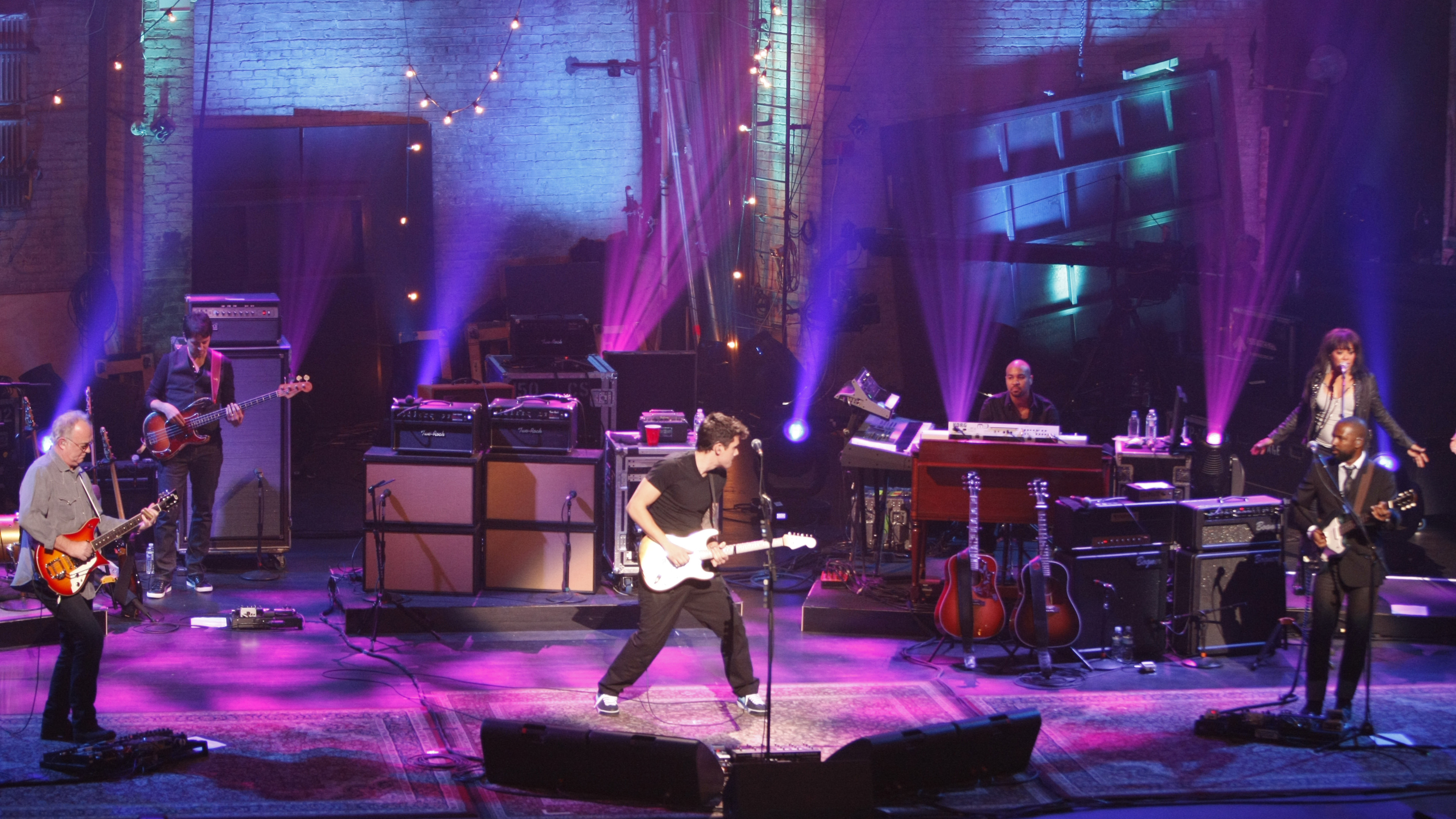
Do you switch them in and out, and do your front end-pedals hit both amps the same?
"They're on the whole time: they're like one amp - I'm using those things as one device."
Is there an overdrive pedal you wouldn't be without?
"Right now it's the Klon Centaur. It's the kindest, most satisfying distortion - it's the best 'loud' I've heard. And I've always used a Marshall Bluesbreaker from the early nineties. It's great… I mean for all the new, little boutiquey clean boosts [puts on pernickety voice], like a boost-drive… [laughs].
"For all that, the Bluesbreaker is still pretty amazing. And I use a Tube Screamer, but I use the TS-10, not the 808 or the TS-09."
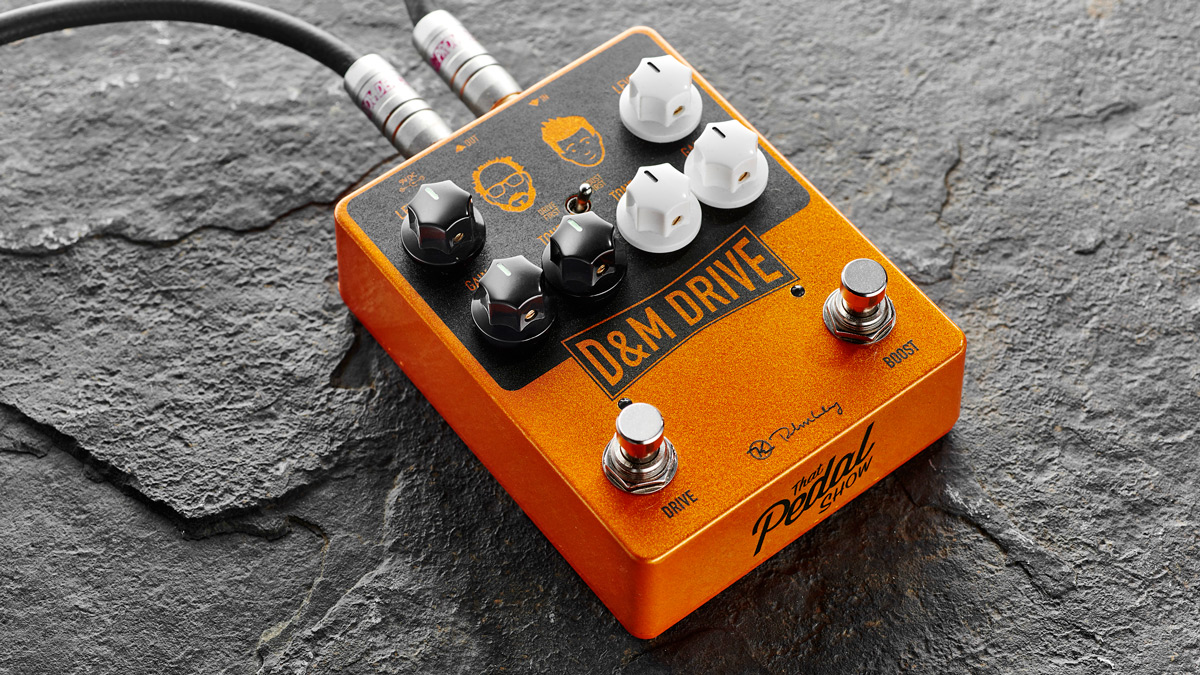
Is that modded by anyone?
"Nope. It's a pedal from the eighties that quietly came and went and they're on eBay for $65 or whatever. Most of those pedals are great - they're all based off the same circuit.
"I can't even believe they're still putting out new distortion pedals - it's the same thing, different shell, different colour.
"[Does posh English accent], Well this one retains all of the harmonic information… Turning it up reveals even more of the… Oh my god… The saturation, smooth highs… Using the volume knob on the guitar, you can vacillate between clean, boost and then full distortion…"
Er, have you been reading Guitarist?
"Oh man, everything does that! You could run your guitar through an old television and it would do that. The more you turn it up, the more it goes arggghhhh!!!!
"It's been the same chips we've been using for the last 30 or 40 years!"
A very different sound then would be the Crossroads cover on the new record - what are you using to achieve that heavy fuzz?
"It's a Pete Cornish box called an NG-2. I don't think there was ever a real use for that - it's just noisy! I mean that guitar is on four - if you turn it all the way up, it sounds like… mistake!
"I just wanted something with ridiculous amounts of fuzz. And it does ridiculous amounts of fuzz, but I found a tone there. It'll probably never be used on anything again.
"There's also no sustain, so it's very hard to play with a pick on that. A couple times I tried soloing on Crossroads with a pick, with that pedal, it doesn't sound right.
"You have to play really staccato notes, and then it sounds cool. [sings] If you start going waaahhhhh [sings big sustaining note], the note doesn't trail off and it just sounds bad."
Have you always alternated between pick and fingers - seems like there's a lot of fingers right now?
"I started playing with a pick all the time. I know I like to snap the pick into my hands, so I can do all this stuff [demonstrates fingerstyle]. Lately, actually, when I think about… Perfectly Lonely starts out with fingers and goes to pick… Yeah…"
The Michael Jackson memorial gig [Mayer played an instrumental version of Human Nature at the show] - were you going to sing?
"No. They put a microphone up on stage before I got up, then when I got up I didn't sing. But I was never going to sing.
"I think they put the microphone up, like, Well if you want to say something… But I didn't want to say anything. In a situation like that, I have nothing to say - what am I going to say?"
A big deal getting asked to do that…
"Comparable to nothing else."
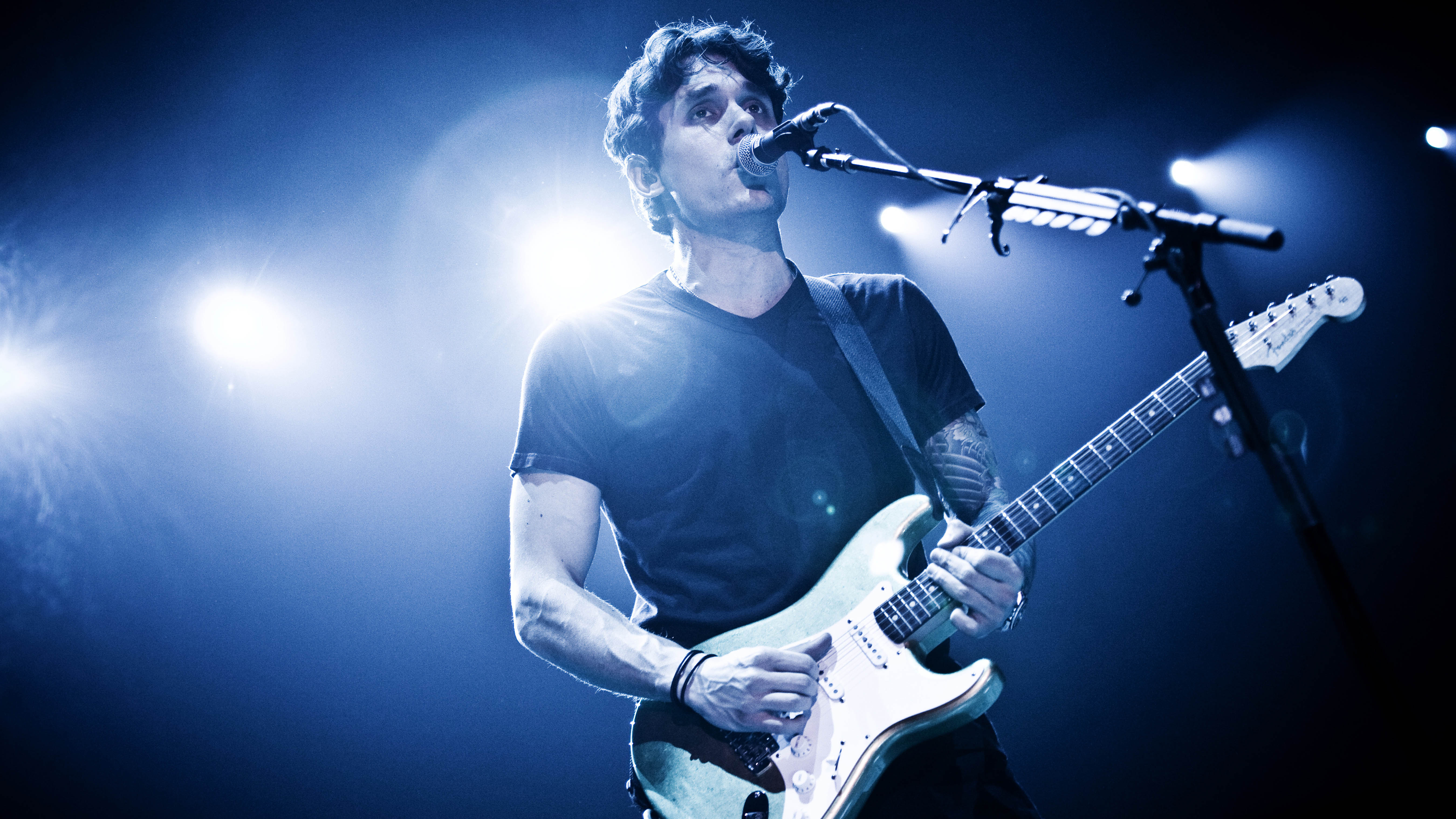
So inevitably then, the whole A-list thing, weekly magazines, paparazzi and all that - it does set you apart from a lot of other musicians, certainly a lot of other guitar players.How does that effect the kid in you that just wants to play the guitar?
"It doesn't at all. It has never changed that joy and passion and chemistry of just picking up the guitar and playing. In fact it's made it more important. That's never been in jeopardy - not that thing!
"When I think about how far I've come as a guitar player, those guys don't care about that. They don't know about that stuff - how many people exiting restaurants and taking photographs know the difference between a Mullard 12AX7 and Telefunken 12AX7? How many know Wes Montgomery Four On Six and know what the hell that is?
"So when I go back to the guitar, it's like that's untouched. Nobody knows that stuff, only us and others of our ilk"
"Or know the difference between a Mogami cable, an Alessandro cable and a Pete Cornish cable? People who read those magazines don't care about all that.
"So when I go back to the guitar, it's like that's untouched. Nobody knows that stuff, only us and others of our ilk.
"I mean no one's ever written anything nasty about my career, because I have one. That's the most important thing: appreciating the fans and playing for them.
"Yeah, you can take my picture when I come out of a club, but you can't take the guitar playing out of me. There – I've just given you the last line for the piece, right?"